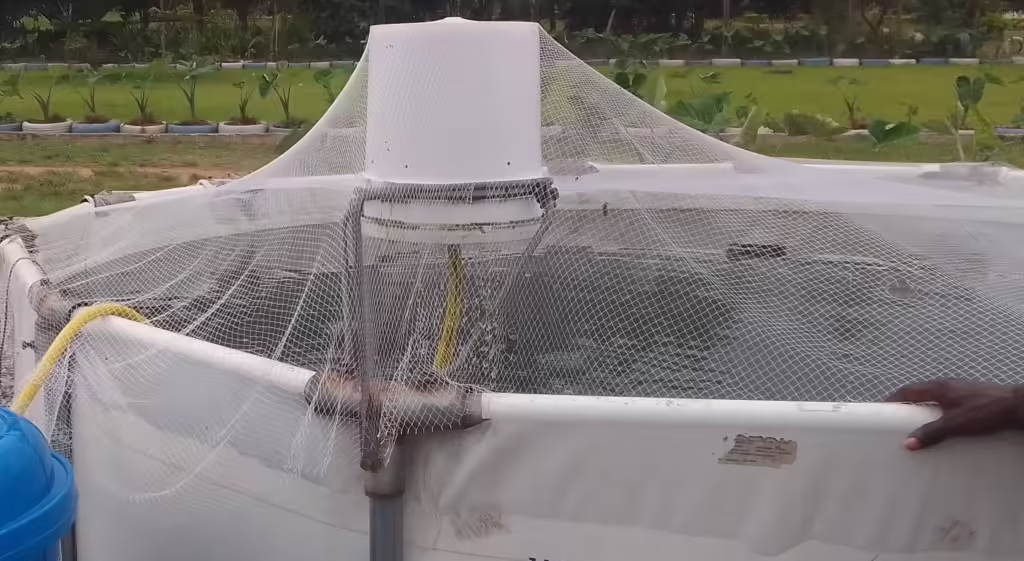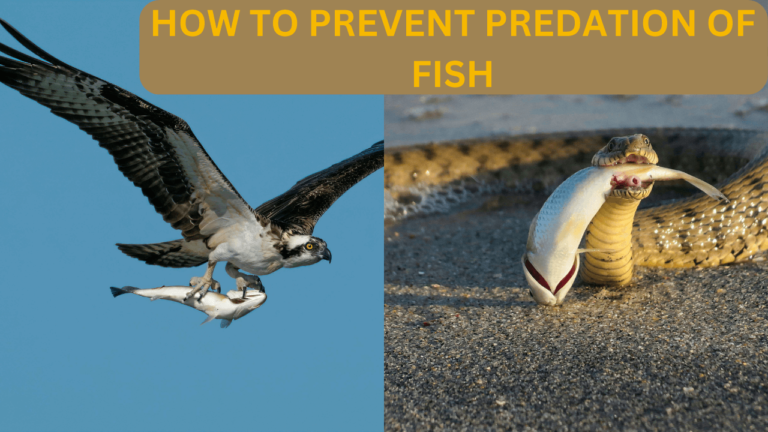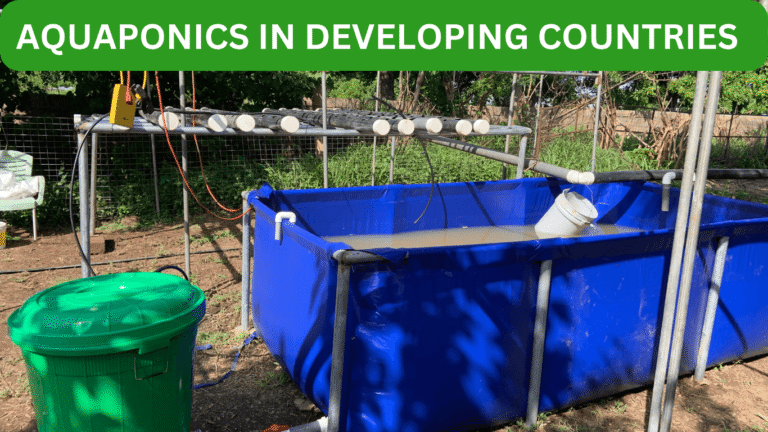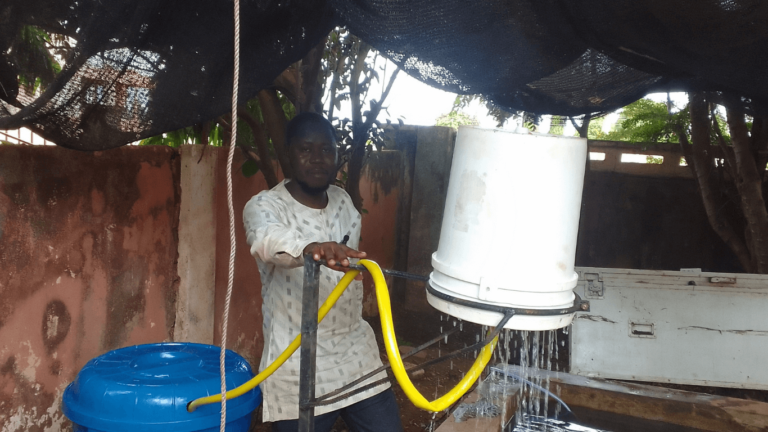6 effective ways to protect your fish farm from predators provided you with practical ways to prevent fish mortality caused by predation. Fish farming is a lucrative venture that requires dedication and careful management to succeed. However, one of the most significant challenges fish farmers face is protecting their ponds and tanks from predators.
Predators, including birds, snakes, frogs, rodents, and even unauthorized humans, can wreak havoc on fish farms by preying on fish or causing stress that leads to reduced growth rates and increased mortality. The financial loss and emotional toll of these activities can be worrying for any farmer.
In this article, we will explore 6 effective ways to protect your fish farm from predators. These strategies will help you minimize losses, ensure a safe environment for your fish, and maintain a profitable fish farming operation.
1. Use Predation Nets
Predation nets are one of the most common and effective tools for protecting fish farms from aerial and terrestrial predators. These nets act as physical barriers, preventing access to the pond or tank.
How Predation Nets Work:
- A tightly woven net is stretched over the fish pond, creating a protective cover that stops predators like birds from going into the fish pond to catch fish.
- Nets can also be installed around the sides of the pond to deter climbing animals such as frogs and rodents.
Benefits of Predation Net
- Prevention of Aerial Attacks: Predation nets keep out birds such as herons, egrets, and kingfishers, which are notorious for feeding on fish.
- Improved Water Quality: Nets prevent debris, leaves, and other contaminants from falling into the pond, which helps maintain water quality.
- Durability: High-quality nets made of materials like polyethylene or nylon are weather-resistant and long-lasting.
Tips for Using Predation Nets
- Ensure the net is securely fastened to prevent gaps that predators could exploit.
- Regularly inspect the net for holes or damage and repair them promptly.
- Choose nets with small enough mesh sizes to prevent smaller predators like frogs from slipping through.

2. Install Electric Fencing
Electric fencing is an excellent way to keep land-based predators away from your fish farm. It provides a reliable barrier that not only deters animals but also adds an extra layer of security against unauthorized human entry.
How Electric Fencing Works
- Electric fences deliver a mild shock when touched, which scares off predators without causing harm.
- The fence can be installed around the perimeter of your fish farm, creating a boundary that prevents access.
Benefits of installing Electric Fencing
- Deterrence of Ground Predators: Electric fencing is highly effective against rodents, snakes, and other ground predators that could harm your fish or damage your infrastructure.
- Human Security: It also serves as a deterrent for trespassers and thieves.
- Low Maintenance: Once installed, electric fences require minimal upkeep.
Tips for Using Electric Fencing
- Ensure the voltage is low enough to avoid injuring animals but strong enough to scare them off.
- Keep vegetation clear around the fence to prevent interference with the electric current.
- Regularly check the power source and wiring to ensure the fence remains functional.

Electric Fence
3. Create a Perimeter Barrier
A solid perimeter barrier is a fundamental defense mechanism for any fish farm. It prevents easy access to your ponds and acts as the first line of protection against predators.
How to Build a Perimeter Barrier
- Use durable materials like concrete, bricks, or corrugated metal sheets to construct a fence around your fish farm. Simply put, build a wall around the fish farms.
- You can also fence with wood such as bamboo, wire, or any strong material around your fish pond.
- Ensure the barrier is tall enough to deter jumping predators and deeply rooted to stop burrowing animals.
Benefits of Perimeter Barriers to Prevent Predation
- Protection Against Most Land Predators: A sturdy barrier keeps out animals like otters, snakes, and rodents.
- Aesthetic Appeal: Adding thorny plants such as bougainvillea along the barrier enhances security and improves the farm’s appearance.
Tips for Perimeter Barriers
- Incorporate gates with secure locks to allow easy access for farm management while preventing unauthorized entry.
- Conduct regular inspections to identify and repair any weak points.
4. Employ Scare Tactics
Scare tactics use psychological deterrence to keep predators away. They rely on creating fear or discomfort for potential intruders, making your fish farm an unappealing target.
Common Scare Tactics
- Visual Devices: Install scarecrows, reflective tape, or shiny objects that move in the wind to scare off birds.
- Auditory Devices: Use noise-makers such as bells, alarms, or motion-activated sprinklers to startle predators like rodents and snakes.
Benefits of Putting Scary Tactics to Prevent Predators
- Cost-Effective: Scare tactics are inexpensive and easy to implement.
- Environmentally Friendly: They deter predators without causing harm to the ecosystem.
Tips for Scare Tactics
- Change the position of scare devices regularly to prevent predators from getting accustomed to them.
- Combine multiple scare tactics for enhanced effectiveness.
- Use solar-powered devices to minimize energy costs and also serve as a renewable source of power.
5. Keep a Guard Animal
Guard animals such as dogs or geese can provide constant surveillance and protection for your fish farm. Their natural instincts make them effective deterrents against various predators.
How Guard Animals Work:
- Dogs: Train a dog to patrol the perimeter of your fish farm. Their barking and presence can scare away predators and alert you to potential threats.
- Geese: Geese are territorial animals that are particularly effective at deterring smaller predators like snakes and frogs.
- Cats: Cats also chase or attack snakes and other reptiles that may prey on fish. Though cats can also serve as predators of fish, when trained well, it can be one of the 6 effective ways to protect your fish farm from predators.
Benefits Guard Animals
- Constant Vigilance: Guard animals provide round-the-clock protection without relying on electricity or technology.
- Human Deterrence: Their presence can discourage trespassers and thieves.
Tips for Using Guard Animals
- Ensure the animals are well-fed and cared for to keep them healthy and alert.
- Train them to recognize and respond to potential threats.
- Create a comfortable shelter for them near the fish farm.

6. Use Motion-Activated Lighting
Predators often strike under the cover of darkness, making motion-activated lighting an effective tool for nighttime protection. This can be an effective way to protect your fish farm from predators
How Motion-Activated Lighting Works
- Lights with motion sensors turn on when movement is detected, startling predators and deterring them from approaching the ponds.
- Solar-powered options are ideal for farms without access to electricity.
Benefits Motion-Activated Lighting
- Nighttime Protection: Bright lights disrupt the activities of nocturnal predators like rodents and snakes.
- Energy Efficiency: Motion-activated lights conserve energy by only turning on when needed.
- Enhanced Security: They can also deter human intruders.
Tips for Using Motion-Activated Lighting
- Install lights at key entry points and areas with high predator activity.
- Regularly clean the sensors to ensure they work effectively.
- Combine lighting with surveillance cameras for added security.
Conclusion
Protecting your fish farm from predators is crucial to safeguarding your investment and ensuring the health and growth of your fish stock.
By implementing these 6 effective ways to protect your fish farm from predators such as using predation nets, installing electric fencing, creating perimeter barriers, employing scare tactics, keeping guard animals, and using motion-activated lighting, you can create a secure environment for your fish farm.
Remember, no single method guarantees complete protection, so combining multiple strategies will yield the best results.
For instance, we’ve fenced around our fish farm with a wall but this can only protect against inland predators. But we also use predation nets when the fish are smaller to protect birds and others.
Regular maintenance and vigilance are essential to keep these protective measures functioning effectively. With these precautions in place, you can focus on optimizing fish growth and reaping the rewards of a successful fish farming operation.
If you want to be more successful in fish farming, consider reading this post.




